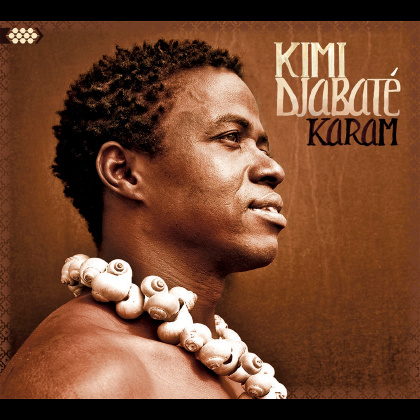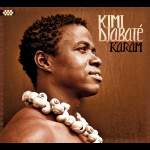- country:Guinea-Bissau
- region:West Africa
- style(s):Tradimodern, World
- label:Cumbancha / Putumayo
- type:Composer/Songwriter
- gender:male
- instrumentation:vocal
- artist posted by:Cumbancha / Putumayo
Line up
- Kimi Djabaté (balafón, kora, vocals, percussion)
Links
Kimi Djabate was raised in Tabato, Guinea-Bissau, a village known for its griots, hereditary singer-poets whose songs of praise and tales of history and legends play an essential role in Africa's musical life. Centuries ago, Djabate's ancestors, a wandering troupe of musicians from Mali, traveled to the region and the king of Guinea so loved their songs he invited them to stay and offered them the territory of Tabato. Ever since, the area has been a recognized center for music, dance, handcrafts and other creative arts.
Djabate was born into a poor but musically accomplished family in Tabato on January 20, 1975. His parents, two brothers and his sister were all professional musicians. Recognized as a prodigy, Djabate began playing the balafon, the African xylophone, when he was just three years old and soon after learned to play many other traditional instruments. As a pre-teen he was sent to the neighboring village of Sonako to study the kora, which provided a foundation for subsequent accomplishments as a guitarist. As his musicianship developed, Djabate also mastered a wide variety of traditional drums and other percussion instruments.
Music was not a past time or a hobby for the young Djabate, however, and from a very young age he was obliged to contribute to the family's income by performing at weddings and baptism ceremonies. Djabate's early talents proved both a gift and a burden, as his family often forced him to sing and dance against his will, and he had little time to partake in the carefree fun and games of other children his age.
Djabate's parents as well as his uncle, provided the young phenom with excellent training in traditional Mandingo music, but Djabate was also interested in popular African genres such as the local dance music style gumbe, Nigerian Afrobeat, Cape Verdean morna, not to mention western jazz and blues.
In 1994, Djabate toured Europe as a member of the national music and dance ensemble of Guinea-Bissau, and he decided to settle in Lisbon, Portugal. Djabate's move to Europe proved to be one of the most difficult experiences of his life, and he faced many personal challenges adapting to a different culture and society.
After over fifteen years in Europe, Djabate still remains devoted to the music he grew up with in Guinea-Bissau, although he brings elements of his own influences and experiences to forge a unique and personal sound. In Europe, Djabate has collaborated with many exceptional musicians, including Mory Kante, Waldemar Bastos, Netos de Gumbe and others. In 2005, Djabate released his first solo album, Terike, which he released independently.
The central theme of Karam, Djabate's second solo album, is Africa: it's social and political realities; the suffering of African people; the fight against poverty; freedom; women's rights; and love. An expression of his griot roots, Karam pays tribute to the people, soul and spirit of Africa that is at the heart of his music.



